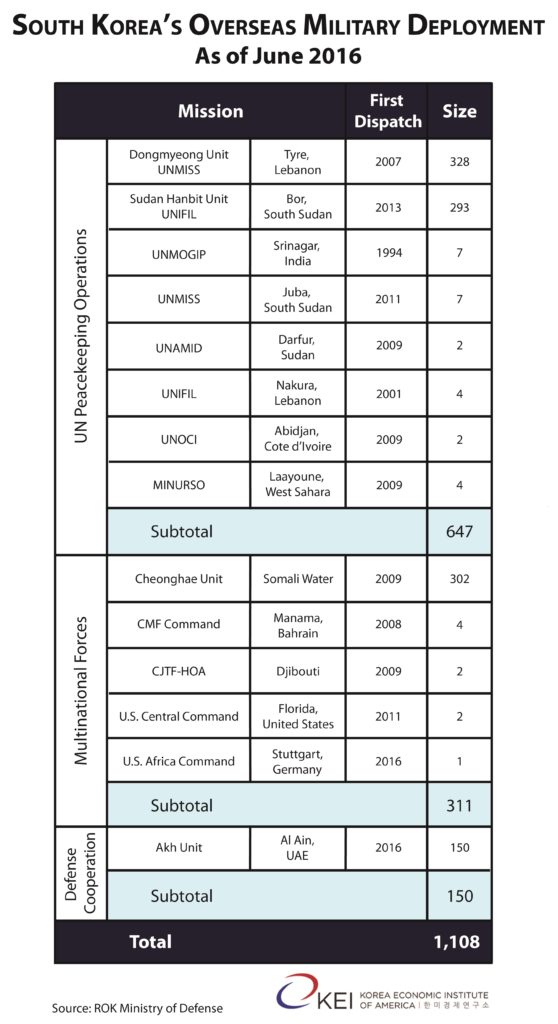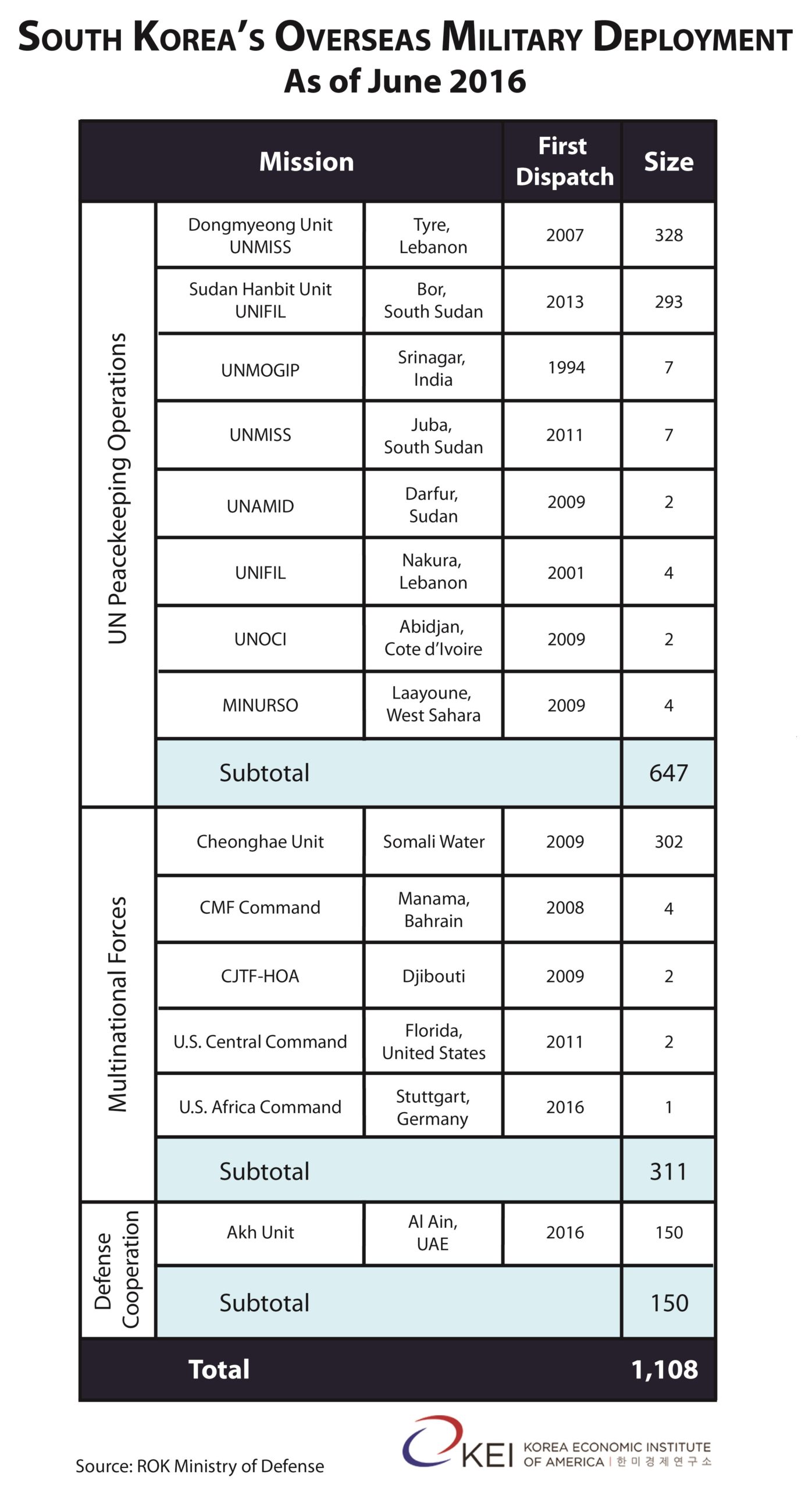The Peninsula
South Korea’s Overseas Peacekeeping Activities – Part II: The Implications for South Korea
Published August 1, 2016
Category: South Korea

By Hojun Song
On July 26, 2016, the Republic of Korea (ROK) Army held a send-off ceremony for deployment of the 18th rotation of the Dongmyeong Unit. This contingent will depart for the United Nations peacekeeping operation (PKO) in Lebanon in early August, renewing its record as South Korea’s longest overseas peacekeeping mission. The Dongmyeong Unit represents South Korea’s growing role in international peacekeeping, where it is now the 12th largest donor to the United Nations peacekeeping budget and has dispatched some 13,500 troops to 18 United Nations PKO missions as of 2015.
Despite the expected costs, most South Koreans are supportive of South Korea’s involvement in overseas peacekeeping missions. In 2010 and 2011, the Jeju Peace Institute (JPI) conducted poll, which showed that 65.1 percent and 64.6 percent of survey participants, respectively, were supportive of South Korean overseas military deployment to United Nations PKO missions. Regarding the results, a JPI research fellow Seong-woo Yi stated that South Koreans generally support contributing to the international community. More recent views of overseas peacekeeping activities remain positive. According to surveys conducted by Hankook Research Ltd. in 2015 and 2016, respectively 75.5 percent and 74 percent of respondents supported the overseas deployment of the ROK Armed Forces.
Moreover, peacekeeping activities bring various fruitful benefits to South Korea. First, South Korea’s peacekeeping activities enhance its reputation among the international community. South Koreans are proud of the fact that South Korea, which was once a beneficiary of international assistance and has now become a donor country, contributes to world peace. In 2014, the then Secretary of National Defense of the Philippines, Voltaire Gazmin, conferred on the Araw unit a “Bakas Parangel” award, which is a special recognition given to individuals or agencies who demonstrate remarkable courage and heroic deeds during a time of natural disaster.
Second, South Korean troops deployed overseas can provide immediate protection to South Koreans in the foreign countries in times of emergency such as civil war or a terrorist attack. For example, the Cheonghae unit which operates in the waters of Somalia conducted evacuation operations for South Koreans in Libya during the Libyan revolution in 2011 and the Libyan civil war in 2014. In 2015, the Cheonghae unit also evacuated South Koreans in Yemen when the conflict between government forces and Houthi rebels deteriorated. On the other hand, the Hanbit unit in South Sudan conducted a rescue operation for South Korean NGO workers threatened by South Sudanese armed robbers in 2013.
Third, South Korea’s overseas military deployments give the ROK Armed Forces opportunities to have field experience and improve its warfighting capability. The deployment to the UAE allowed the Akh unit chances to enhance its operational capability in an environment with desert terrain and high temperatures. The UAE was also a better location for parachute training than South Korea due to its sunny weather. Another benefit for the Akh unit to use the high-tech training facilities such as a high-priced virtual reality combat system which the UAE had purchased from the U.S. defense industry firms. The anti-pirate operations of the Cheonghae unit were also helpful in improving the ROK navy’s actual combat capability.
Fourth, South Korea’s military cooperative activities promote the national interest through increased bilateral cooperation with a partner states. The deployment of the Akh unit enhanced the diplomatic relations between South Korea and the UAE, which provides 14 percent of South Korea’s oil imports and is the second largest importer of South Korean goods in the Middle East. The Akh unit may also have had a positive role in the UAE choosing South Korea for a $20 billion contract to build four nuclear power plants in Abu Dhabi. Similarly, South Korean firms won a $31.5 million contract of operational consulting of a new Erbil airport and a $3.5 billion package deal of oilfield and social overhead capital development in Basra as the Zaytun division was deployed in Iraq over 4 years. Likewise, as the Hanbit unit won the hearts of local South Sudanese through civil affairs operations, it is expected to be positive for South Korean firms looking to engage in business once the security situation is stabilized.
Lastly, South Korea’s contributions to peacekeeping activities are also believed to have the benefit of building good will with states in the event of a second Korean War or another crisis where there may be a need for foreign governments to provide military support to South Korea. On the previously mentioned poll conducted by Hankook Research Ltd in July 2016, 85.6 percent of respondents expected that South Korea’s overseas military deployment will lead to more military support from other countries in time of emergency.
Admittedly, there are some criticisms from South Koreans regarding the overseas deployment of the ROK Armed Forces. As the security condition in Lebanon and South Sudan has recently deteriorated, South Koreans are more concerned about security of their soldiers deployed overseas. Also, a recent slow-down in economic growth in South Korea might make public opinion less favorable to continuing to pay for peacekeeping activities on foreign soil. However, considering the active public support and possible benefits, the balance sheet seems favorable to the deployment.
South Korea continues to show consistent support overseas peacekeeping activities, as all existing dispatches were extended with strong support from the National Assembly. With support from both the South Korean public and policy makers, South Korean soldiers deployed overseas will continue to represent South Korea and promote universal values for the world peace and prosperity.
Hojun Song is an intern with the Korea Economic Institute and a graduate student at the Fletcher School of Law and Diplomacy at Tufts University.
Photo from Expert Infantry’s photostream on flickr Creative Commons.

